New Delhi:The Supreme Court has said that to reduce the sentence in a murder case would risk undermining the seriousness of the crime and the sanctity of life itself, and a murder committed with the intent to target vital organs, particularly in a group setting, reflects a level of intent and cruelty that demands an appropriate punitive response. The apex court emphasised that crimes rooted in political rivalry often have far-reaching consequences, beyond the immediate loss of life, and they contribute to social unrest and weakening public confidence in the rule of law.
A bench comprising justices Vikram Nath and Prasanna B Varale, in a verdict delivered on December 6, upheld conviction and sentence of life term imposed on a UDF sympathiser for killing a rival LDF worker in 2006. On April 10, 2006, the sympathisers of the United Democratic Front (UDF) and Left Democratic Front (LDF) fought against each other in connection with the dispute regarding the drawing of their election symbol at a place near a library in Kunnappalli, Pathaikkara village.
Justice Nath, who authored the judgment on behalf of the bench, refused the contention of the appellant that there was no deliberate intent to commit murder, and the offence happened in private defence.
Justice Nath noted that the deliberate act of stabbing vital parts of the body, coupled with the force used, indicates that the appellant must have been aware of the likely fatal consequences of his actions.
“Under the provisions of Section 300 IPC, an intention to cause such injuries that are sufficient in the ordinary course of nature to cause death qualifies as murder, and even if ingredients other than the intention to cause murder are proved, mere knowledge of the result of fatal actions is enough to ascribe culpability to the accused person”, said the bench.
The apex court dismissed an appeal filed by Kunhimuhammed alias Kunheethu, 67 years old, an IUML sympathiser in the case related to the murder of Subramanian on April 11, 2006.
Justice Nath said the offence occurred in the context of political rivalry, a factor that exacerbates its gravity. “Crimes rooted in such motives often have far-reaching consequences beyond the immediate loss of life, contributing to social unrest and weakening public confidence in the rule of law”, said the bench.
Justice Nath said a murder committed with the intent to target vital organs, particularly in a group setting, reflects a level of intent and cruelty that demands an appropriate punitive response. “To reduce the sentence in such a case would risk undermining the seriousness of the crime and the sanctity of life itself, principles that the judicial system is duty-bound to uphold”, he said.
